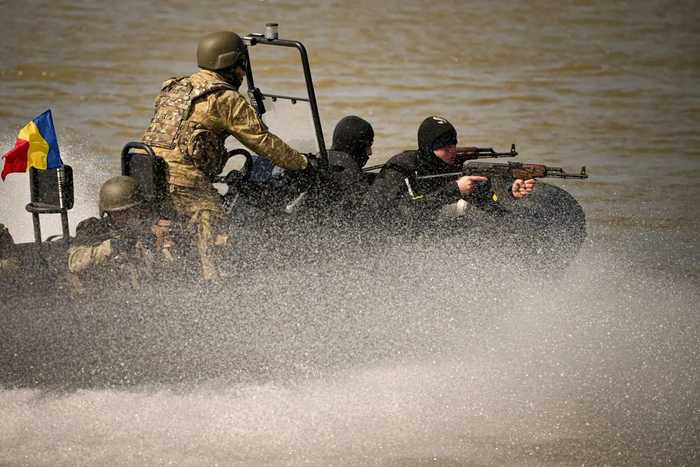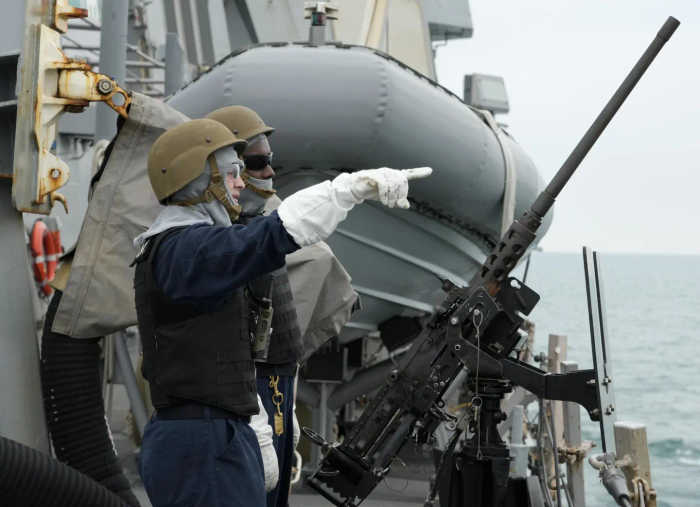Published 14:37 IST, January 15th 2024
Turkey, Bulgaria, Romania form Trilateral defense alliance aimed to clear mines from the Black Sea
Defense leaders from Turkey, Bulgaria, and Romania formalized a groundbreaking pact on January 11, aimed at protecting Black Sea shipping routes from mines.
- Defence
- 4 min read
Defense leaders from Turkey, Bulgaria, and Romania solidified a groundbreaking pact on January 11, formalizing an alliance aimed at protecting Black Sea shipping routes from the persistent threat of mines, a consequence of Russia's ongoing aggression against Ukraine. The memorandum of understanding, signed by Turkish Defense Minister Yaşar Güler, Bulgarian Deputy Defense Minister Atanas Zapryanov, and Romanian Defense Minister Angel Tîlvăr, marks a pivotal moment in a strategic initiative proposed by Turkey back in September. This collaborative effort is now pending approval from the respective national governments.
The trilateral agreement outlines a comprehensive task force featuring three mine countermeasures ships – one from each participating country – along with a dedicated command-and-control ship. The operational plan includes deployments lasting 15 days, occurring at least twice every six months. This collaborative effort reflects a strategic response to the increasing hazards posed by mines in the Black Sea, a region that has transformed into a theatre of conflict since Russia's full-scale invasion of Ukraine in February 2022.
Incidents prompt urgency in safeguarding maritime routes
The urgency for such collective initiatives became glaringly evident when a Panama-flagged cargo ship, en route to a Danube River port to load grain crucial for war-hit Ukraine, encountered a mine in the Black Sea. The explosion not only disrupted the vessel's course but also initiated a fire on deck, causing injuries to two crew members. This incident, the second involving a Russian mine in as many months, underscores the heightened risks and unpredictability in the Black Sea since the onset of Russia's aggression.
Since the invasion, the Black Sea has witnessed a transformation into a zone of conflict, with its waters strewn with mines, and its skies filled with drones and missiles. Russian attacks have not only targeted areas near the borders of NATO members Romania and Bulgaria but have also posed a direct threat to vital shipping routes that have long served as a lifeline for Ukraine. The region, usually bustling with tourists headed for Black Sea resorts, has witnessed a downturn due to the unsettling presence of drifting mines.

To ensure the efficacy of this maritime defense initiative, a committee of naval commanders from the three participating nations will oversee the mine countermeasures program, convening for meetings at least twice annually. The leadership will rotate every six months, fostering shared responsibility and cooperation. Notably, a statement from the Turkish defense ministry emphasized that the activities are not directed against any specific country, aligning with Ankara's diplomatic stance of avoiding explicit confrontation with Russia. Instead, the initiative aims to strengthen collaboration and foster neighborly relations among the participating nations without undermining NATO's ongoing deterrence and defense activities in the Black Sea region.
Bulgaria boasts three Tripartite-class mine hunters, three Sony-class minesweepers from the Soviet era, and six Olya-class inshore minesweepers. Romania contributes four Musca-class minesweepers and has recently acquired Sandown minehunters from the UK. The Turkish Navy, an active participant, deploys five Engin-class mine hunters, procured from France in 1997, along with six Aydın-class ships.
NATO's acknowledgment and the context of Black Sea dynamics
While not formally engaged, NATO has welcomed this trilateral initiative, recognizing the substantial risks posed by Russia's actions in the Black Sea to freedom of navigation. The alliance views the efforts by Bulgaria, Romania, and Turkey as integral to enhancing the safety of navigation in the region. The idea of such a "trilateral initiative" was first proposed by NATO defense ministers on October 12, with the primary objective of creating a security belt free from mines to protect ships carrying essential Ukrainian exports.

Tensions escalated in July 2022 when Russia withdrew from a 2022 UN-brokered Black Sea grain export deal. In a provocative move, Russia threatened to treat all vessels as potential military targets. To ensure the safe transport of its grain to market, Ukraine established a new shipping corridor, hugging Romania's and Bulgaria's coastlines on the Black Sea. This trilateral pact emerges as a strategic response to the geopolitical complexities and risks associated with safeguarding critical maritime routes in this strategically significant region.
Updated 14:37 IST, January 15th 2024